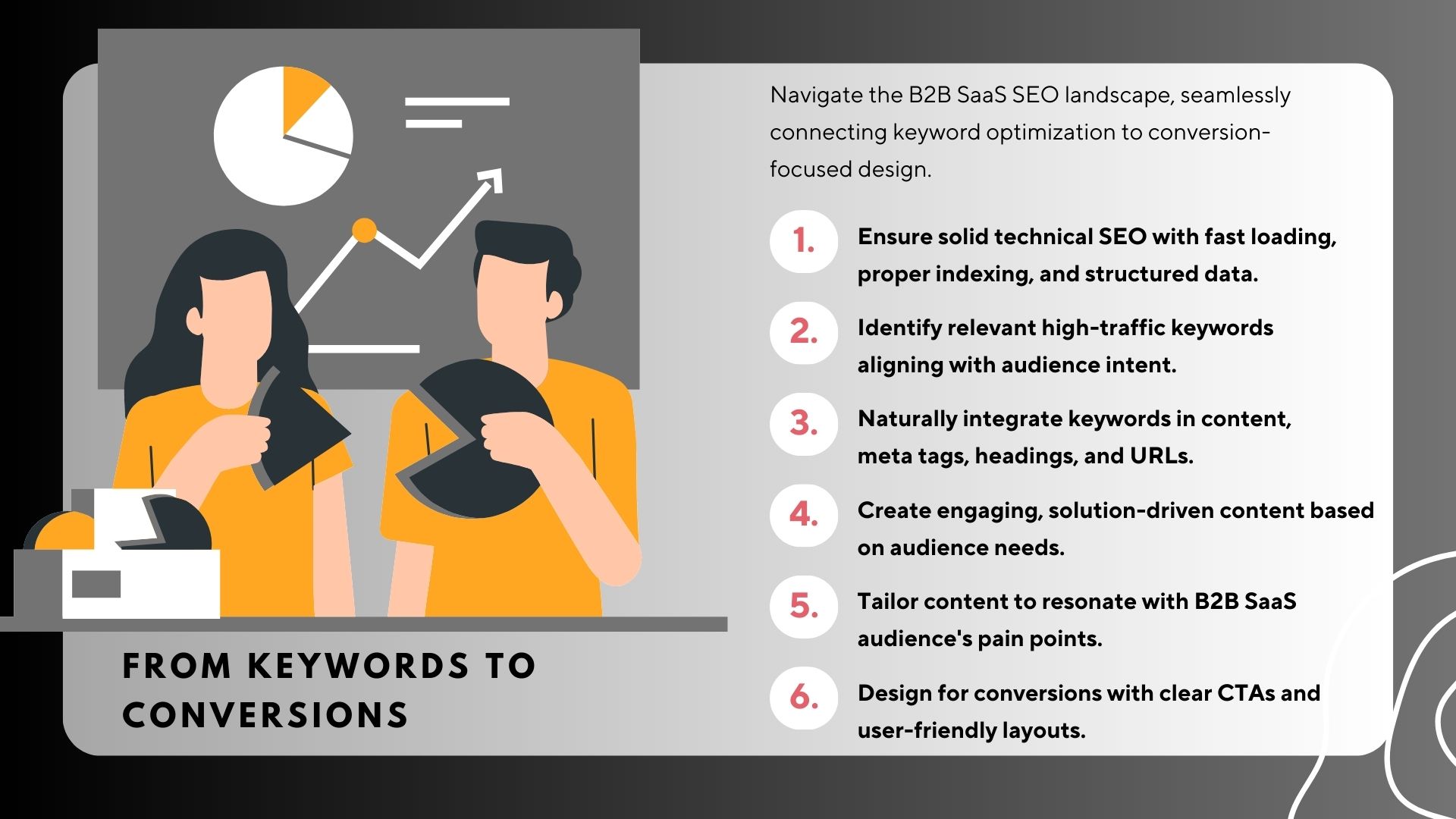Smart SEO for B2B SaaS Success
In the world of online business, B2B companies are all about selling their tech services to other businesses. But to make sure they get noticed by the right people on the internet, they need smart tricks – that’s where SEO comes in. Imagine it like putting up a big signpost on the internet highway so everyone can find you easily. But for B2B SaaS, it’s a bit different.
Crafting good B2B SEO content is like laying down a sturdy foundation in the world of online presence; it’s the fundamental strategy that involves utilizing SEO to help businesses shine by mastering the basics and beyond. In this article, we’re diving into special SEO tricks designed just for these types of companies. We’ll uncover the secrets to showing up more on searches, getting more potential customers, and growing even better online.
In the realm of B2B, crafting the right type of content is crucial, and an SEO guide may just be the helping hand needed to ensure success, especially since B2B strategies require that extra touch of finesse. Navigating the B2B landscape is like piecing together a jigsaw puzzle; each part, from on-page SEO to creating the right kind of content, forms a crucial component that, with the help of SEO, may seamlessly guide businesses through the intricate funnel for B2B success.

How to Choose Keywords That Work?
Imagine your B2B SEO strategy as an ultimate guide, leading the way through the territories of new content creation, tailored to suit the needs of the many B2B enterprises seeking to master the art of on page SEO.
When it comes to B2B SaaS, technical SEO is your foundation, Remarks Sahil Kakkar, the CEO of WebSignals “Keyword Research, and On-Page SEO are some effective techniques to achieve these goals. Conduct thorough keyword research to identify relevant and high-traffic keywords related to your SaaS product. Incorporate these keywords naturally into your website’s content, meta tags, headings, and URLs to improve search engine rankings. Also, optimize meta tags, write compelling meta titles and meta descriptions that include relevant keywords and accurately describe the page content. Keep them within character limits to ensure they display correctly in search results.
In addition, create valuable, informative, and engaging content that answers users’ queries. Understand your target audience’s needs, pain points, and interests. Your content should be relevant and address their specific challenges or interests. Conduct market research and collect feedback from existing customers to gain insights into what topics resonate with your audience.
By combining effective keyword research and on-page SEO practices, you can improve your SaaS website’s visibility, attract organic traffic, and increase the likelihood of converting visitors into customers.”
Creating Content People Actually Want
Imagine implementing a well-rounded SEO strategy for your SaaS website, where comprehensive keyword research, valuable content creation, and user-focused optimizations work harmoniously to elevate your search rankings and foster meaningful customer engagement in a fiercely competitive landscape.
Understanding the specific help B2B enterprises need is like having a compass for your SEO journey; it helps tailor your complete B2B SEO strategy and guides you towards the right SEO services that can genuinely help B2B companies with their SEO needs.
According to Ritu Baghel, SEO Specialist at Linkly “There are several effective techniques to optimize SaaS websites, improve search rankings, and attract more customers in a competitive landscape:
Comprehensive Keyword Research: Conduct in-depth keyword research to identify relevant and high-traffic keywords. Use these keywords strategically in website content, meta tags, headings, and URLs to improve search engine visibility.
Quality Content Creation: Produce valuable, informative, and engaging content that addresses the needs of your target audience. High-quality content attracts organic traffic, encourages backlinks, and establishes your website as a reliable resource.
On-Page Optimization: Optimize on-page elements like title tags, meta descriptions, and header tags to improve keyword relevance and click-through rates in search results.
Mobile-Friendly and Responsive Design: Ensure your SaaS website is fully responsive and mobile-friendly, as Google considers mobile usability a crucial ranking factor. A seamless mobile experience enhances user satisfaction and encourages longer visits.
Site Speed and Performance: Improve site loading speed by optimizing images, leveraging browser caching, and utilizing content delivery networks (CDNs). Faster websites rank better in search engines and offer a better user experience.
Link Building: Earn high-quality backlinks from reputable websites in your industry. Guest posting, influencer outreach, and content partnerships can help build a strong backlink profile and increase your website’s authority.
Social Media Presence: Engage with your audience on social media platforms, share valuable content, and interact with potential customers. Social signals can positively influence search rankings.
User Experience (UX) Optimization: Create intuitive navigation, clear calls-to-action, and easy-to-use forms to enhance the user experience and encourage conversions.
Customer Reviews and Testimonials: Encourage satisfied customers to leave reviews and testimonials. Positive reviews not only build trust but also impact local search rankings.
Analytics and Data Analysis: Utilize web analytics tools to track website performance, user behavior, and conversion metrics. Data-driven insights can guide continuous improvements to your SEO strategy.
By implementing these techniques, your SaaS website can improve its search rankings, attract more customers, and gain a competitive advantage in the market. Remember that SEO is an ongoing process, so stay up-to-date with industry trends and adapt your strategy accordingly to achieve long-term success.”
Difference Between B2B SEO and B2C SEO
B2B organizations are coming to understand the crucial function SEO techniques play in strengthening their online presence and spurring growth in the dynamic business environment of 2023. The core of successful SEO (Search Engine Optimization) campaigns continues to be keyword optimization despite growing distinctions between B2B and B2C SEO. Success depends on thorough keyword research that is targeted to the specific characteristics of the B2B market. Beyond only optimizing for keywords, B2B business must also match their content strategy to the precise search intent of their target market. This necessitates a thorough comprehension of the buyer personas and the keywords they use. Every piece of content should be properly suited to the B2B search environment, from on-page SEO elements like meta descriptions and landing pages to technical SEO and off-page SEO strategies like constructing trustworthy backlinks. Crafting engaging B2B content that resonates with your target audience’s specific search terms is essential for successful digital marketing. Creating relevant, educational content that is customized to the demands of the B2B buyer becomes a cornerstone of the SEO campaign in this setting, where content marketing strategy takes center stage. B2B SEO efforts must adapt to the changing nature of search engines by utilizing cutting-edge tools and tactics to make sure that their client’s products or services rank highly in the search volumes.
The compass directing organizations towards greater exposure and long-term success in B2B SEO tools in 2023 will be a strategic, research-driven approach that understands the subtle difference between B2B and B2C SEO

Effective B2B SEO Strategy For B2B Companies
Looking to create a thorough and successful B2B SEO strategy in 2023? Look nowhere else. Your key to understanding the ever-changing world of B2B-specific search engine optimization is this guide to B2B SEO strategy. Understanding the complexities of B2B search engine optimization is essential for the success of your company, whether you’re an experienced marketer or new to the field. Different from B2C methods, B2B SEO calls for a focused strategy that appeals directly to your B2B audience. A successful B2B SEO strategy should take into account the following:
B2B vs. B2C SEO: Recognize the distinctive contrasts between B2C and B2B SEO strategies. What appeals to B2B customers may not always be the same as what does for B2C.
Keyword Strategy: Conduct in-depth keyword research that is particular to your industry and target market. Your B2B SEO efforts are built on your keyword strategy.
Content is Key: Key to Content B2B content marketing of the highest caliber is crucial. Make interesting, insightful content that speaks to the problems and obstacles your B2B buyers encounter.
Content Variety: Expand the range of your available content. Each form of content, from blog posts to whitepapers and case studies, has a specific function in your B2B SEO strategy is crucial.
Local SEO Matters: Don’t undervalue the significance of local SEO for B2B enterprises. To draw customers in your area, focus on optimizing for location-based keywords.
Stay Updated: Stay current on the newest developments and trends in B2B search engine optimization. The environment is always changing, therefore being informed
B2B Branding: Integrate your SEO approach with your B2B brand identity. Enhancing recognition and trust through consistency across all digital touchpoints.
Regularly Posting New Stuff: Regularly posting new stuff. Search engines are alerted by new material that your website is active and pertinent.
B2B SEO and digital marketing: For a well-rounded and effective strategy, incorporate your B2B SEO strategy into your overall digital marketing strategy.
This is the definitive guide to understanding B2B SEO, and B2B marketers. These tips will up your B2B search engine optimization game whether you’re starting from zero or improving your present strategy.
With the help of this comprehensive B2B SEO strategy guide, you’ll be able to design an effective B2B SEO campaign that speaks directly to your target market, increases the exposure of your brand, and yields tangible results.
Conclusion
Developing a successful SEO content strategy for B2B world requires a unique approach that recognizes the distinction between B2B and B2C SEO efforts. While on-page SEO and keywords remain central, the B2B SEO campaign must acknowledge that B2B websites often target a more niche audience. This means B2B marketers need to focus on producing high-performing SEO posts that cater to specific B2B keywords and address the needs of businesses throughout the sales funnel.
Off-page SEO includes building connections within the B2B community, which can significantly boost your SEO. Overall B2B SEO and B2C SEO isn’t solely about appealing visuals; it’s about offering value through informative content. Collaborating with a specialized B2B SEO agency can help tailor your strategy to the unique requirements of the B2B market, ultimately enhancing your SEO efforts and online presence.
